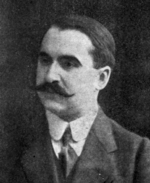A. de Herz, Date of Birth, Place of Birth, Date of Death
TweetA. de Herz
Romanian playwright (1887-1936)About A. de Herz
- Adolf Edmund George de Herz, commonly shortened to A.
- de Herz, also rendered as Hertz and Her? (December 15, 1887 – March 9, 1936), was a Romanian playwright and literary journalist, also active as a poet, short story author, and stage actor.
- He was the scion of an upper-class assimilated Jewish family, with its roots in Austria-Hungary.
- His grandfather, Adolf Sr, was a controversial banker and venture capitalist, while his father, Edgar von Herz, was noted as a translator of Romanian literature.
- Adolf had a privileged childhood and debuted as a poet while still in high school, producing the lyrics to a hit romance.
- In his early work for the stage, Herz was a traditionalist inspired by Alexandru Davila and the Samanatorul school, but later veered toward neoclassical literature and aestheticism.
- His "salon comedies", staged by the National Theater Bucharest, borrowed from various authors, including Roberto Bracco, Henri Lavedan, and Haralamb Lecca, peaking in popularity in 1913, with Paianjenul ("The Spider").
- By the start of World War I, Herz was also a writer of revues. Controversy followed Herz during the early 1910s, when his writing raised suspicions of plagiarism.
- A vaster controversy came with Romania's participation in the war, when Herz became noted as a supporter of the Central Powers.
- He remained in German-occupied territory, putting out the daily paper Scena, which became a leading voice of Romanian "Germanophilia", but was also a pioneering contribution to cultural journalism.
- He was arrested by returning loyalists during late 1918, and sent to Vacare?ti prison, but was finally acquitted in March 1919.
- The controversy nevertheless survived, also leading to authorship disputes with a former friend, Ioan Alexandru Bratescu-Voine?ti, and provoking the enmity of writers Liviu Rebreanu and George Ranetti. The financially insecure Herz continued to publish plays and translations, embarking on a lasting collaboration with Constantin Tanase, and writing a revue for Josephine Baker.
- Starring in his own plays, he also served for a while as editor of a cultural supplement, Adevarul Literar ?i Artistic, then briefly as head of Diminea?a daily and as interviewer for the Radio Company.
- Eventually, he accepted appointment as chair of the National Theater Craiova in 1930.
- Toppled by intrigues in 1935, he died the following year, after an illness of the lungs.
Read more at Wikipedia
See Also
- Famous People's Birthdays on 15 December, Romania
- Famous People's Birthdays in December, Romania
- Famous poet's Birthdays on 15 December, Romania
- Famous poet's Birthdays in December, Romania
- Famous playwright's Birthdays on 15 December, Romania
- Famous playwright's Birthdays in December, Romania
- Famous translator's Birthdays on 15 December, Romania
- Famous translator's Birthdays in December, Romania
- Famous songwriter's Birthdays on 15 December, Romania
- Famous songwriter's Birthdays in December, Romania


 Date of Birth:
Date of Birth:  Place of Birth: Bucharest
Place of Birth: Bucharest